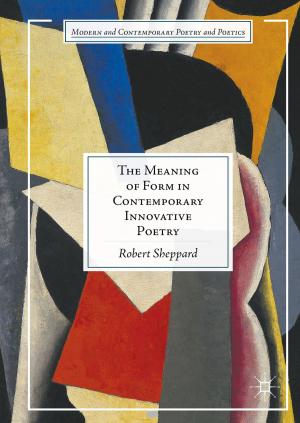Women Writing Fancy
Authorship and Autonomy from 1611 to 1812
Fiction & Literature, Literary Theory & Criticism, British, Nonfiction, Social & Cultural Studies, Social Science, Gender Studies| Author: | Maura Smyth | ISBN: | 9783319494272 |
| Publisher: | Springer International Publishing | Publication: | July 11, 2017 |
| Imprint: | Palgrave Macmillan | Language: | English |
| Author: | Maura Smyth |
| ISBN: | 9783319494272 |
| Publisher: | Springer International Publishing |
| Publication: | July 11, 2017 |
| Imprint: | Palgrave Macmillan |
| Language: | English |
This book brings to the foreground the largely forgotten “Fancy” of the seventeenth and eighteenth centuries and follows its traces as they extend into the nineteenth and twentieth. Trivialized for its flightiness and femininity, Fancy nonetheless provided seventeenth- and eighteenth-century women writers such as Margaret Cavendish, Aphra Behn, Delarivier Manley, Eliza Haywood, and Anna Barbauld a mode of vision that could detect flaws in the Enlightenment’s patriarchal systems and glimpse new, female-authored worlds and genres. In carving out unreal, fanciful spaces within the larger frame of patriarchal culture, these women writers planted Fancy—and, with it, female authorial invention—at the cornerstone of Enlightenment empirical endeavor. By finally taking Fancy seriously, this book offers an alternate genealogy of female authorship and a new framework for understanding modernity’s triumph.
This book brings to the foreground the largely forgotten “Fancy” of the seventeenth and eighteenth centuries and follows its traces as they extend into the nineteenth and twentieth. Trivialized for its flightiness and femininity, Fancy nonetheless provided seventeenth- and eighteenth-century women writers such as Margaret Cavendish, Aphra Behn, Delarivier Manley, Eliza Haywood, and Anna Barbauld a mode of vision that could detect flaws in the Enlightenment’s patriarchal systems and glimpse new, female-authored worlds and genres. In carving out unreal, fanciful spaces within the larger frame of patriarchal culture, these women writers planted Fancy—and, with it, female authorial invention—at the cornerstone of Enlightenment empirical endeavor. By finally taking Fancy seriously, this book offers an alternate genealogy of female authorship and a new framework for understanding modernity’s triumph.















